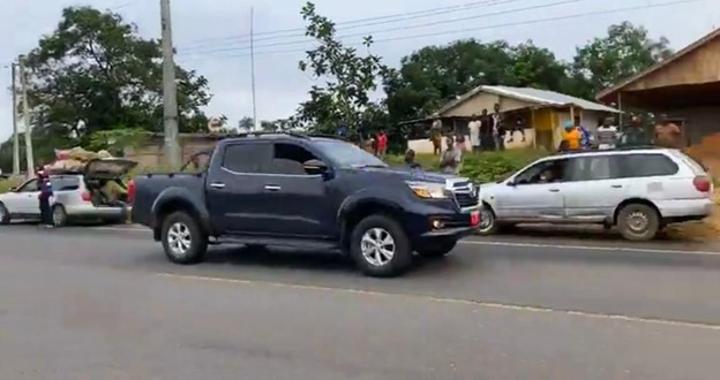Africa-Press – Liberia. Public frustration boiled over following an unprecedented security operation by the Liberia National Police (LNP) on Saturday, which brought traffic to a standstill and stranded hundreds of passengers along the main Kakata-Monrovia highway for more than two hours.
The disruption came as President Joseph Boakai was expected to travel to Gbarnga, Bong County, to attend the 4th commencement ceremony of the Bong Technical College.
FrontPageAfrica reporter in Margibi County can confirm that, police officers — some heavily armed — established multiple roadblocks at strategic points including the Margibi-Montserrado border, Kingsville Number 7, and Mount Barclays. The lockdown, which caught motorists and passengers off-guard, was reportedly put in place to secure the President’s route.
The abrupt traffic halt affected over 100 commercial and private vehicles, stranding businesspeople, market women, healthcare workers, students, and daily commuters. The lack of prior public notification and the heavy-handed approach by security forces triggered widespread outrage, both on the ground and across social media.
Many passengers, including those transporting perishable goods, were forced to wait inside hot, overcrowded vehicles with no information about when they would be allowed to proceed. For some, the delays meant missing medical appointments, work shifts, and business opportunities.
Journalist Emmanuel Degleh, who was among those delayed, described the scene as chaotic and poorly coordinated.
“It was frustrating and disorganized,” Degleh said. “Only vehicles traveling from Red-Light to Kakata were allowed to move, while the ones coming from Kakata to Monrovia were completely blocked. People were confused, angry, and helpless.”
“This impacted a lot of people who depend on this route for their daily business,” Degleh added. “It wasn’t just an inconvenience—it disrupted livelihoods.”
While authorities have not issued a formal explanation for the scale of the security operation, the backlash from the public has been swift and intense. Many Liberians have characterized the roadblocks as a sign of growing authoritarianism under the Boakai administration.
“This is troubling. It’s a re-emergence of tyranny in our country,” said Facebook user Aloysius Namue, echoing a sentiment that quickly spread online under the banner of “#CreepingDictatorship.”
Opposition leader Sekou Kalasco Damaro was among the most vocal critics, calling the action “the reincarnation of ex-Liberian President Ghankay [Charles G. Taylor],” in reference to Liberia’s former president, who was known for deploying elite security forces like the SOD (Special Operations Division) and ATU (Anti-Terrorist Unit) to suppress dissent.
Social media platforms were flooded with comparisons to Taylor’s regime. Justine Y. Kanneh posted: “It’s manifesting itself — my Liberian people, the reintroduction of Charles Taylor’s SOD and ATU.” Another user, Sir Norman, wrote: “Information dissemination is an issue. This is unusual and concerning.”
Many observers fear that if such actions become normalized, they could signal a dangerous shift in Liberia’s democratic trajectory.
“Today, it’s a roadblock for security; tomorrow, it could be censorship or suppression,” said activist Mary Weah. “We’ve seen this movie before—and we know how it ends.”
Political analyst Dr. Nathaniel Gaye described the situation as “a governance test” for the Boakai administration.
“While security is important, transparency and public communication are even more vital in a democracy. The fact that people were left in the dark, literally and figuratively, for hours, without any official update, is unacceptable,” Dr. Gaye noted.
Not everyone saw the police actions as excessive. Some citizens called for understanding, citing the need to respect the office of the presidency.
“Even if you spend the whole day here, it’s not a bad thing. Respect the presidency first,” said commuter Paul Togbah. “This is about national leadership, and security should come first.”
Within the Unity Party — the ruling establishment — officials and supporters defended the roadblocks as necessary for national security.
Former Representative of Margibi County, Ben Fofana, Vice Chair for Governmental and International Relations, stated: “These precautions are taken for classified reasons and occur globally. You may not understand due to lack of knowledge about the President’s security details. But such measures are not abnormal in state security operations.”
William Zankpah Mabiah Greatness, another party loyalist, added: “President Boakai has traveled that route many times, and this has never happened. If it’s happening now, it’s because of credible security intelligence. Let’s stop politicking and respect the security protocols put in place.”
The Liberia National Police (LNP) and the Executive Protection Service (EPS) have remained silent on the issue. However, an EPS insider, who spoke to FrontPageAfrica on condition of anonymity, said the lockdown was part of a plan to guarantee the President’s safety during his movement to and from Bong County.
“The EPS is responsible for the safety of the President and VIPs. These kinds of operations are coordinated in response to intelligence. It may not always be visible to the public, but it is our mandate,” the source said.
For More News And Analysis About Liberia Follow Africa-Press






